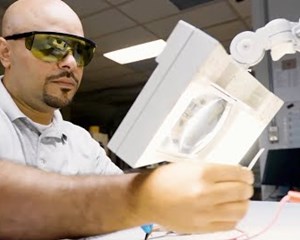AMNA NAWAZ: Well, the pandemic has made this a most unusual time in the labor market. Millions of lost jobs are not yet filled. And yet, still, there are reports of labor shortages in many sectors and a large percentage of workers who say they are looking for a new job. For some without a bachelor's degree, job prospects were bleak even before the pandemic. Paul Solman looks at a program that is offering better opportunities. It's latest in our Work Shift series.
PAUL SOLMAN: Adquena Faine's last job before the pandemic, driving for Uber and Lyft in Virginia.
ADQUENA FAINE, Former Rideshare Driver: I was driving so much, I would lay down and try to take a nap or go to sleep, and I still felt the vibrations of the car.
PAUL SOLMAN: No time or money to finish college, barely able to feed her daughter and pay for a hotel room after foreclosure on their home. Food for herself?
ADQUENA FAINE: Before I got on the road to drive, I would stop and forage in the woods or like on the side streets.
PAUL SOLMAN: You were actually foraging for food at some point? I have never heard that before.
ADQUENA FAINE: People will stop and ask, what are you doing? And I'm like, oh, nothing, because I don't want anybody to start coming to pick my food.
PAUL SOLMAN: In Louisiana, Jennifer Burgess went straight from high school to dog training.
JENNIFER BURGESS, Former Dog Trainer: For 15 years, I have actually trained over 10,000 dogs.
PAUL SOLMAN: And so how much money did you make there?
JENNIFER BURGESS: On my best year ever, maybe 28.
PAUL SOLMAN: Twenty eight thousand dollars?
JENNIFER BURGESS: My best year ever.
PAUL SOLMAN: Mariana Perez was 20 when she emigrated from Mexico in 2005, without a high school degree or even any English, spent nine years working in a North Carolina nail salon.
MARIANA PEREZ, Former Nail Technician: I used to work 60 to 70 hours a week.
PAUL SOLMAN: Sixty to 70?
MARIANA PEREZ: Yes. I had no benefits. We don't have any vacation pay. So, if you don't work, you don't earn money.
PAUL SOLMAN: On the plus side, however:
MARIANA PEREZ: I miss some of my clients. They were very, very nice people.
JENNIFER BURGESS: I love working with dogs.
PAUL SOLMAN: But the pay?

JENNIFER BURGESS: I went from $6.10 an hour to $11.25 an hour over 15 years.
PAUL SOLMAN: Two problems have plagued the U.S. economy for decades now, income inequality and young folks not working at all. Low pay for those with just high school or less is an obvious explanation.
BYRON AUGUSTE, President and Co-Founder, Opportunity@Work: Sixty percent of Americans in the work force today do not have bachelor's degrees.
PAUL SOLMAN: But, asks economist Byron Auguste:
BYRON AUGUSTE: Why is there such a difference in earnings between people who are college graduates and people who are not in this country? It's simply not the case that not having a bachelor's degree means that you don't have skills to contribute. Thirty million today have the skills, based on the work they're doing, for jobs that pay at least 50 percent more than the jobs they're in.
PAUL SOLMAN: Meanwhile, employers are begging for employees, boasting $20 an hour, where once $15 was thought magnanimous. But $20 an hour is barely $40,000 a year.
NARRATOR: These are the computers.
PAUL SOLMAN: OK, time for one more player in this story, IBM, once the icon of high tech in America.
NARRATOR: These machines are things of gleaming, varicolored metal and numerous flashing lights.
PAUL SOLMAN: Selling and servicing huge computers, Big Blue and its big machines were attacked by little Apple with its mini Mac back in 1984. IBM was worth 30-something times the value of Apple as a company back then. Today, Apple is worth 16 times as much as IBM. And yet IBM has survived by cutting costs drastically, including layoffs, changing its business, outsourcing, and it still employs 350,000 people worldwide. Here in the U.S., however, it finds itself competing for talent witness the trendier Apples, Googles and start-ups. So, Kelli Jordan spearheads IBM's new collar initiative.
KELLI JORDAN, Director, Career, Skills and Performance, IBM: Back in 2016, we really started looking at how we could fill roles that we had just struggled to fill in other ways. Just saying you don't require a bachelor's degree brought in a whole new slate of candidates that we never would have uncovered.












